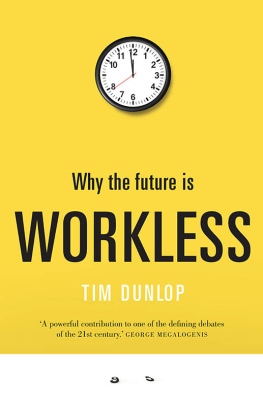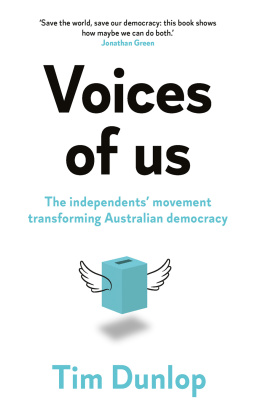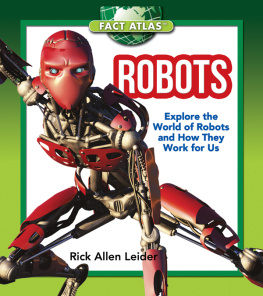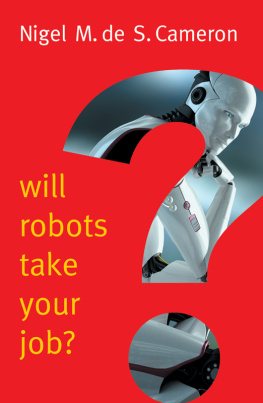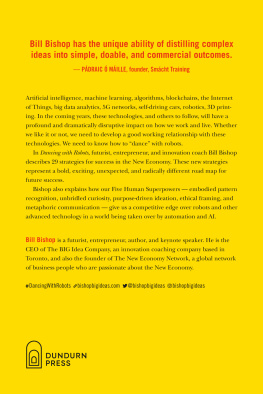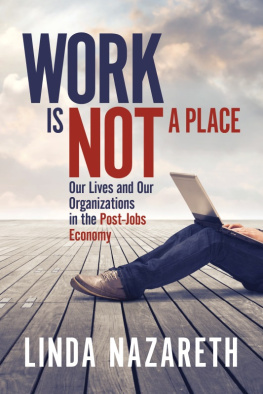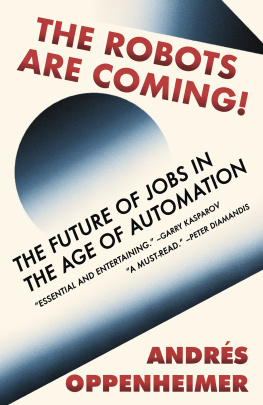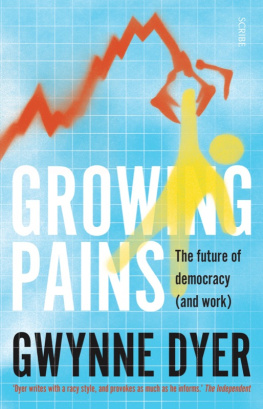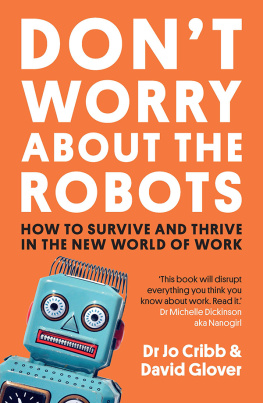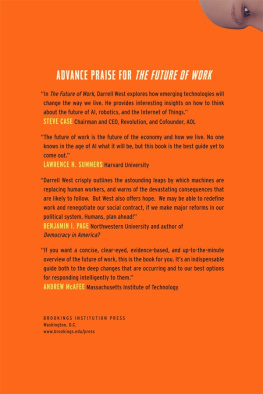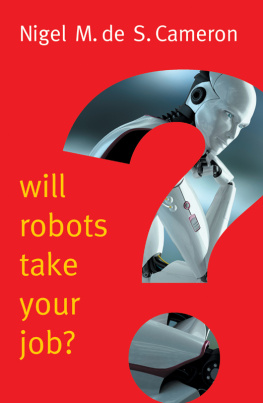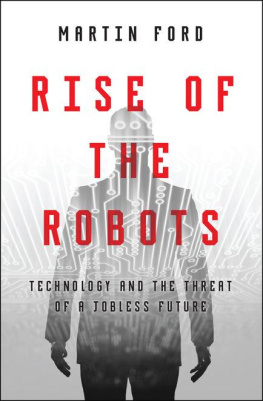Why the future is
WORKLESS
TIM DUNLOP is a writer, academic and author. His book The New Front Page: New media and the rise of the audience is a seminal text on the early days of the digital media revolution. He has a PhD in political philosophy, and has written and broadcast extensively on US and Australian politics, the media and the future of work. He lives in Melbourne, Australia, with his wife, Tanya and his son, Noah.
Why the future is
WORKLESS
TIM DUNLOP

A NewSouth book
Published by
NewSouth Publishing
University of New South Wales Press Ltd
University of New South Wales
Sydney NSW 2052
AUSTRALIA
newsouthpublishing.com
Tim Dunlop 2016
First published 2016
10 9 8 7 6 5 4 3 2 1
This book is copyright. Apart from any fair dealing for the purpose of private study, research, criticism or review, as permitted under the Copyright Act, no part of this book may be reproduced by any process without written permission. Inquiries should be addressed to the publisher.
National Library of Australia
Cataloguing-in-Publication entry
Creator: Dunlop, Tim, author.
Title: Why the future is workless / Tim Dunlop.
ISBN | 9781742234823 (paperback) |
9781742242569 (ebook) |
9781742247991 (epdf) |
Subjects: Economics.
Economic forecasting.
Employment forecasting.
Technological unemployment
Occupations Effect of technological innovations on.
Wealth Forecasting
Dewey Number: 331.12
Design Stan Lamond
Cover design Design by Committee
Printer Griffin
All reasonable efforts were taken to obtain permission to use copyright material reproduced in this book, but in some cases copyright could not be traced. The author welcomes information in this regard.

This book is printed on paper using fibre supplied from plantation or sustainably managed forests.
For Noah
Introduction
Gradually, however, it was found possible to induce many of them to accept an ethic according to which it was their duty to work hard, although part of their work went to support others in idleness.
BERTRAND RUSSELL
If you can get up early enough and miss the peak-hour traffic, it takes about ten hours to drive from the northern suburbs of Sydney where my parents live to where I live in Melbourne with my wife and son. Ive covered that 900 kilometres often over the years, and its a pretty nice drive too, if a bit long. I must admit I like the thought of sitting back and doing the trip inside a car that can drive itself, a prospect that is becoming increasingly likely. But lets not get ahead of ourselves.
As it happens, I was staying with Mum and Dad back in 2013 when I wrote the first outline of this book, having got interested in the topic about a year before that. I finished the 6000-word draft one Saturday afternoon and got up at 5.30 the next morning to drive home. By the time I stopped in Albury five or six hours later to get some lunch and petrol for the car, something occurred to me. I had set an alarm on my phone to wake up for the early start. I had sneaked down the hall to the bathroom, guiding myself by the flashlight app on my phone. I had used the map app on my phone to set the route for my journey back to Melbourne. In the car, I synced my phone with a bluetooth speaker and listened to music and podcasts I had downloaded. Oh, and when I got to Albury I actually used my phone as a phone to ring my wife to let her know when Id be arriving.
Id had a mobile for years by then, but this was the first time it had really struck me how central to my life that little box of magic had become. And it wasnt as if my early morning routine had exhausted the range of things that it could do. As we all know, we can also use them to access immense databases of useful information, play games, watch movies, take and share photographs in an instant, read a book write a book or find out what movie is on near us, what restaurants are available, where our friends are and what they are doing, or where the nearest public toilet is (yes, theres an app for that). We can order a car to drive us somewhere, have a three-course meal from a fancy restaurant delivered to our door, or line up a date for the night. We can even organise a job for ourselves.
The technology shines on us like a sun, no doubt. But it also casts a shadow, and sometimes the wonderful and the terrible are almost indistinguishable from each other.
Those devices we carry around in our pockets also allow others to track us, to know where we are and where we have been, what we have watched, what we have spent our money on, who we have spoken to and for how long, what books, music, food and perversions we have sought out. Our most intimate personal information is increasingly known to governments, security agencies and private corporations. Their ability to track us is sold to us in the name of protecting us from terrorism, or, in the case of the corporations, in the name of offering us a better user experience. In many ways it makes us uneasy, but the truth is, we have welcomed Big Brother in willingly. We allow ourselves to be surveilled because having a phone with geolocation and cloud memory and payment facilities and search facilities and a way to talk to people and to remember things and share stuff with friends and family is convenient, useful and exciting. Big Brother is also Big Santa.
This book is an attempt to understand the relationship between the technologies that are reshaping our connections with each other and the natural world, and our ability to control them. It is particularly addressed to the area of work and what it means to live in a world where technology is increasingly automating many common jobs. Work remains central to our conception of how it is we are meant to live, but paid employment seems to be increasingly scarce, unstable, insecure and worst of all failing to pay us a wage that can sustain a decent standard of living across a human lifetime. Under such circumstances, work looks, to my eyes, like an idea that has outlived its usefulness. I would go so far as to say the era of full-time work is coming to an end and we have to stop holding out the false promise that at some magical moment the jobs are going to reappear.
Smartphones are at the heart of a lot of what is happening, but they represent only a tiny fraction of the tech that is likely to transform our lives. Endless articles and books examining what robots can and cant do list a stunning array of technologies from 3D printers that can create human bones suitable for transplant, to driverless vehicles that have the potential to render every truck driver in the world unemployed, to humanoid artificial intelligence programs that can diagnose and treat post-traumatic stress. Developments like these leave us more than a little gobsmacked and uncertain about the future. In some tellings of the story we are heading for the benign and entirely recognisable middle-class future of The Jetsons; in others, we are plunging headlong into the malign robot world of The Terminator. Indeed, the likes of scientist Stephen Hawking and entrepreneur Elon Musk have been quoted at length and ad nauseum, arguing about whether artificial intelligence will eventually achieve consciousness, be smarter than us and take over. But heres the thing: asking whether robots will take our jobs is the wrong question. And by asking it that way, we get the wrong answer.
Next page
